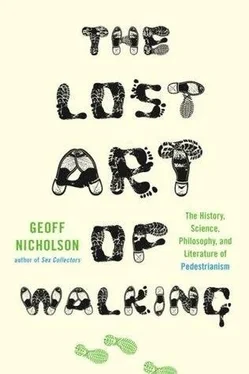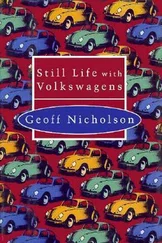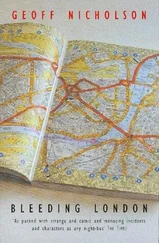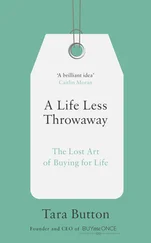Sometimes, as in Russian, a reverse principle seems to be at work. Instead of having many words for walk, the word for walk itself can have many meanings other than simply putting one foot in front of the other. The Russian word bodit ’ is usually translated simply as to walk or to go, but it also contains the senses of sail, ply, move, visit, attend to a sick person, circulate money, wear, look after, take care of, nurse, step, straddle, foster children, play cards, scuff, scuffle, shin, flop along, tag along, herd, tend to, track, traffic, go at a crawl, and find one’s feet.
The Dutch use one or two words that look a lot like their English counterparts — lopen, wandelen, promeneren , for instance — but they also have the wonderful ijsberen , which means pacing to and fro ( ijsbeer being the Dutch word for polar bear). They also use flaneren , which brings us back to the French word flaner , and to psychogeography.
The French have really hit the conceptual jackpot with the word flâner , a truly wonderful word in that it means simultaneously to walk and to not walk. It can indeed mean to stroll, but it can also mean the act of simply hanging around, staying right where you are and not walking at all. There is something gloriously perverse about this, and it is, of course, the root of flaneur .
♦
Another part of my qualifications for considering myself a walker was my familiarity with the standard texts on walking. The connection between walking and writing is an obvious one. Walkers write — writers walk. There are quite a number of usual suspects:
Thoreau, because he wrote the ‘book’, or essay or lecture, called ‘Walking’. And his fellow Americans Emerson and Hawthorne and Whitman, the last of whom wrote, ‘Afoot and light-hearted / I take to the open road’.
And Wordsworth, and also his sister Dorothy, who walked with him and wrote about it in her diary:
‘March 30, 1798. Walked I know not where. March 31, 1798. Walked. April 1, 1798. Walked by moonlight.’
And their friend Coleridge, who calculated that Wordsworth had walked 180,000 miles over the course of his life. And De Quincey, and William Blake, and John Clare, and John Keats with an epistolary account of his walking tour of the Lake District and the Scottish Highlands.
And Boswell and Johnson touring the Western Isles, which must have been a strain, given Boswell’s description of Johnson’s physical condition:
‘His figure was large and well formed, and his countenance of the cast of an ancient statue — yet his appearance was rendered strange and somewhat uncouth, by convulsive cramps. So morbid was his temperament, that he never knew the natural joy of a free and vigorous use of his limbs: when he walked, it was like the struggling gait of one in fetters.’
And Mark Twain in the Alps, and Robert Frost in ‘The Road Not Taken’, which is a wonderful work if you read it as a poem suggesting that you end up in much the same place regardless of which road you take, and you might think that’s the only sensible way it can be read, yet there seem to be a lot of people who want to read it as a poem about strident individualism.
And Charles Dickens, naturally, passim, but especially in ‘Night Walks’ and the opening of The Old Curiosity Shop , and there are the stories about him saying to guests at his house, ‘Let’s have a walk before dinner’, and then dragging them around the countryside for a few hours and coming home later after covering twelve or thirteen miles.
And Henri Michaux’s poem ‘Marchand’, which puns, in French, on marchant meaning walking and merchant meaning salesman. And Frank O’Hara’s poem ‘Walking to Work’, with the opening lines ‘It’s going to be the sunny side / from now / on’, and also his poem ‘Ode on Causality’, which contains the phrase ‘standing still and walking in New York’, which is also the title of a collection of his essays.
And there’s Joyce’s Ulysses , and Paul Auster’s New York Trilogy , and Walter Benjamin, and Flaubert, and Proust in Swarm’s Way , and Borges in ‘The Garden of Forking Paths’, and Samuel Beckett in Lessness — ‘One step in the ruins in the sand on his back in the endlessness he will make it’.
I respect the great, more or less, contemporary nonfiction walkers, travel writers such as John Hillaby, Peter Jenkins, Edward Abbey, and Bill Bryson. And one or two of them, Sebastian Snow and Bruce Chatwin, I absolutely love. But I have a problem reading most of them. They make me feel guilty. They make me feel I should be doing what they’re doing. I should be out there walking, covering the miles, pitting myself against the elements, not sitting about reading.
♦
Modern literary theory sees a similarity between walking and writing that I find persuasive: words inscribe a text in the same way that a walk inscribes space. In The Practice of Everyday Life , Michel de Certeau writes:
‘‘The act of walking…is a process of appropriation of the topographical system on the part of the pedestrian — it is a special acting-out of the place…and it implies relations among differentiated positions.’
I think this is a fancy way of saying that writing is one way of making the world our own, and that walking is another.
Being outside the loop of academic theory, I had never come across de Certeau until I read an essay by Markus Poetzsch, which I sought out because I was so impressed by its title, ‘Walks Alone and “I know not where”: Dorothy Wordsworth’s Deviant Pedestrianism’. As well as parsing de Certeau, Poetzsch writes:
‘‘No less than the physical act, the literary acts of Romantic pedestrianism are, from their earliest beginnings, bound up with notions of deviance and deviation, with a willful turning away from what is generically, or shall we say topographically, normative: the well-trodden path. From the ‘devious feet’ of William Wordsworth’s speaker in ‘An Evening Walk’, to the socially and ‘self-leveling expeditions’…of Thelwall’s Ambulator’, to the unsociable traveler in Hazlitt’s ‘On Going a Journey’ who walks expressly ‘to get rid of others’…to Clare’s autobiographical account of his escape from High Beech asylum near Epping, the textualization of walking in the period is marked by a self-conscious nonconformism. The mere act of foregrounding this most taken-for-granted and familiar of motions signals unconventionally, for it ascribes to pedestrian activities hitherto unrealized significance.’
As I sat in Los Angeles rereading the literature, nursing my broken arm, and doing rather little walking, I was at least becoming a student of my own condition, and I found one interesting local literary precedent. In the 1950 sAldous Huxley, author, explorer of inner space, knocker at the doors of perception, had lived in the Hollywood Hills, not far from where I did. The Hills reminded him of Greece.
Huxley was a walker, writer, and thinker in the great English literary tradition. David King Dunaway’s Huxley in Hollywood describes a typical day in the life of Aldous Huxley: getting up, writing six to ten pages, eating the lunch prepared for him by his maid, and then at one-thirty setting off on a long walk through the Hollywood Hills, getting back home in time for tea.
He often walked with other people — his wife arranged a series of entertaining but inconsequential mistresses for him — but on at least one occasion he walked alone and had a nasty fall. The area was far less built up than now and Huxley fell among scrub and dirt, a soft landing compared to mine and one that didn’t result in any breakages. However, Huxley’s fall was also less unexpected than mine. He was an old man and half-blind. He had far better excuses than I did, but I still liked to think of him as a fellow traveler and tumbler.
Читать дальше












